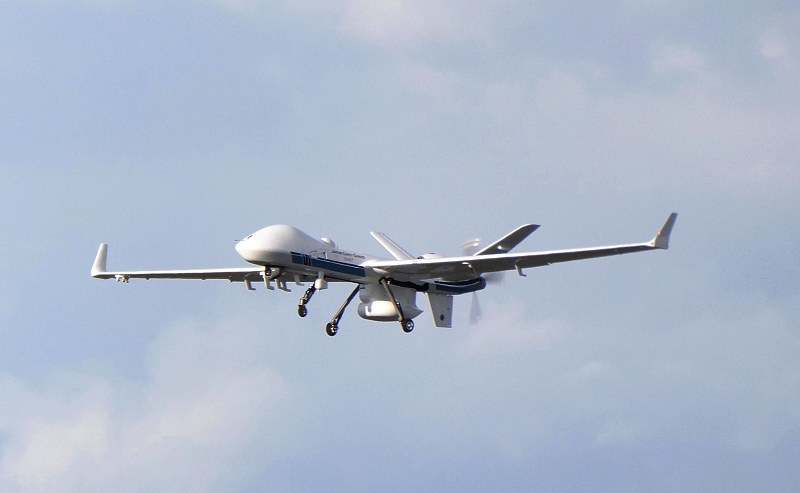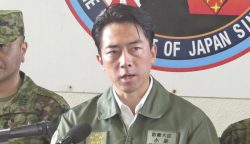
SeaGuardian
17:53 JST, November 7, 2022
The Japan Coast Guard and the Maritime Self-Defense Force have begun planning joint operation of an unmanned patrol aircraft as early as fiscal 2023 to enhance maritime surveillance, government sources have said.
With Chinese and Russian vessels active in the seas around Japan, the JCG and MSDF plan to conduct surveillance more effectively by sharing data obtained from an unmanned aircraft that the JCG has begun operating. The joint operation is set to be a pillar of the organizations’ efforts to enhance cooperation with each other.
The aircraft to be jointly operated is a SeaGuardian, produced by General Atomics, an American company. The unmanned aircraft boasts superior surveillance capabilities, as it is equipped with devices such as nighttime infrared cameras and sensors, and it will be tasked with conducting searches after maritime accidents and issuing warnings to suspicious ships, among other missions.
The aircraft is 11.7 meters long, with a wing span of 24 meters. It is said to be able to fly for more than 24 hours at a time, allowing it to navigate at least once around the perimeter of Japan’s exclusive economic zone before landing.
The JCG started operating its SeaGuardian on Oct. 19, using the MSDF’s Hachinohe Air Base in Hachinohe, Aomori Prefecture, for the drone’s home base. The two organizations plan to quickly establish a three-drone system and deploy at least one of the aircraft in the Nansei region extending from the southern edge of Kyushu to near Taiwan.
Currently, images received from the aircraft are provided to the MSDF after they have been processed to a certain extent, but such data will be shared in real time from fiscal 2023.
Once aircraft operations have been verified, joint operation will begin, with the MSDF carrying out test flights when the drone is not being used by the JCG.
The Self-Defense Forces have introduced Global Hawk unmanned aircraft designed mainly to patrol fixed targets, but have not started operating the aircraft. The SDF does not possess unmanned aircraft to patrol wide swathes of the sea. The MSDF is considering procuring its own SeaGuardian if the joint operation shows positive results.
In the East China Sea, the Chinese military frequently flies unmanned aircraft. The Air Self-Defense Force scrambles fighter jets to confront these drones, which are much cheaper to operate, and it has been argued that such a response is not cost-effective.
Consequently, the SDF plans to explore use of the MSDF’s unmanned aircraft to monitor aircraft and vessels in cases where there is low risk of intrusion into Japan’s air space or territorial waters. An idea has also surfaced to station a drone at air base on Tokyo’s Iwoto Island in the village of Ogasawara to enhance surveillance functions for the Pacific Ocean.
Cooperation between the JCG and the MSDF has become a key point in the government’s discussions on how to drastically enhance the nation’s defense capabilities.
In waters around the Senkaku Islands of Okinawa Prefecture, the JCG, as a Japanese law enforcement unit, has been confronting China Coast Guard vessels. However, it is essential to have a system that allows for the MSDF to take over seamlessly if there is an incident that escalates beyond what the JCG can handle. To this end, the government plans to study coordination between the two organizations in emergencies, in addition to promoting general cooperation between the two.
Top Articles in Politics
-

Japan PM Takaichi’s Cabinet Resigns en Masse
-

Sanae Takaichi Elected Prime Minister of Japan; Keeps All Cabinet Appointees from Previous Term
-

Japan’s Govt to Submit Road Map for Growth Strategy in March, PM Takaichi to Announce in Upcoming Policy Speech
-

LDP Wins Historic Landslide Victory
-

LDP Wins Landslide Victory, Secures Single-party Majority; Ruling Coalition with JIP Poised to Secure Over 300 seats (UPDATE 1)
JN ACCESS RANKING
-

Japan PM Takaichi’s Cabinet Resigns en Masse
-

Japan Institute to Use Domestic Commercial Optical Lattice Clock to Set Japan Standard Time
-

Israeli Ambassador to Japan Speaks about Japan’s Role in the Reconstruction of Gaza
-

Man Infected with Measles Reportedly Dined at Restaurant in Tokyo Station
-

Videos Plagiarized, Reposted with False Subtitles Claiming ‘Ryukyu Belongs to China’; Anti-China False Information Also Posted in Japan





















